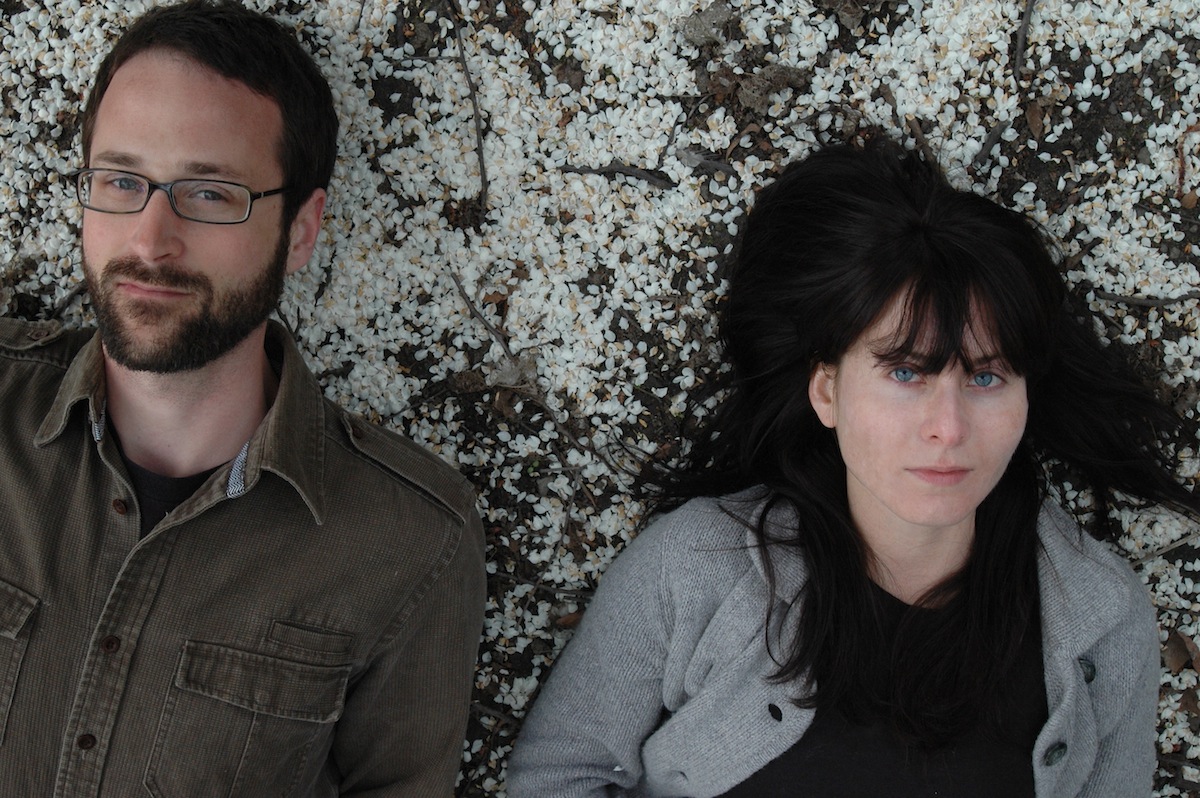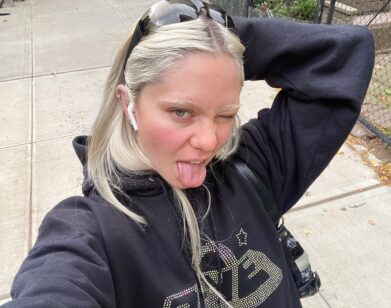Trespassers William is a Good Ghost

ABOVE: MATT BROWN AND ANNA-LYNNE WILLIAMS OF TRESPASSERS WILLIAM. IMAGE COURTESY OF ANTHON SMITH
While most people were planning Halloween parties last year, Trespassers William was preparing its funeral. Anna-Lynne Williams and Matt Brown had decided to call it quits, and quietly worked on their final record together in a Seattle apartment. Cast, out this week courtesy of Saint Marie, is a collection of rarities and other forgotten excerpts from the Seattle duo’s long-spanning career. “Giving up isn’t really our style,” says Williams. “We were given the opportunity to just take that little bit of what was left in us and do something amazing with it. It’s this beautiful way to say goodbye to something.”
One of Seattle’s best-kept secrets, Trespassers Williams haunted the scene throughout the ’90s and the aughts, channeling the mesmerizing likes of contemporaries Mazzy Star and Slowdive. Following unexpected lineup changes and personal turmoil, the band fell relatively silent—shortly after the release of 2009’s The Natural Order of Things EP, nary a thing was heard from the pair until the very first of the year, when they officially announced their dissolution as a band. Interview caught up with Williams at home in Seattle, where she sat down with us to reminiscence about her band, overcoming tendonitis, a bright future, and good ghosts.
JOHN TAYLOR: I want to set something straight—is Trespassers William officially finished? Because there was the gap in new material from 2006 to 2009, and from that year until now with Cast.
ANNA-LYNNE WILLIAMS: Yeah, we announced it officially on January 1, but it had been leading in that direction for a while. When we moved to Seattle, our drummer decided not to make the move with us. Matt and I kept writing and rehearsing as a duo and went on tour [anyway]. Then last year I got tendonitis. It exacerbated his and my relationship, [and] we both decided that Trespassers William was done. Which doesn’t mean we might not work on something else in the future… but for now we’re exploring our own personal musical identities. It’s probably something we both needed to do anyway—we’ve been playing music together since we were 17.
TAYLOR: I read that you were going through physical therapy for the tendonitis.
WILLIAMS: It’s really expensive. I got health insurance, which covers some of it. I would take those tomato paste cans, the teeny little ones, and I would lift them. I would put my arm down on the table, and I would just hold it. To the side, up and down. I actually couldn’t even turn my arm—I would have to put my elbows at my side, put my palm down, and turn my hand over. That was a horrible, difficult stretch for me. It was really, really bad. And it was coming from a stressful, sleepless time. I was working on way too much music, and things were really challenging—texting was a nightmare. I was pretty excited when I was able to start typing with both hands again. I’m taking herbs every day, doing stretches, all that stuff. If I don’t, then it comes back. Or if I forget, and pick up something, like a grocery bag, then it’s like, “Oh, no!”
TAYLOR: It could always be worse. Knock on wood, right? I mean… don’t literally knock on wood, that might be bad for your wrists.
WILLIAMS: [laughs] People are so funny. Like, I’m allergic to garlic. When I say that to people, they go, “Oh, my God! I’d rather die.” It’s the same thing with guitar players—when they hear [I] can’t play guitar anymore, they’re like, “I would rather die.” But you really think about it, and most people in the world have much bigger problems than one of their hands hurting.
And it brought me back to poetry too, which was a big thing for me. Last year, I couldn’t do so many things. I sat around for months in bed, writing poetry with one hand. I have a renewed interest in words that’s making up for the fact that I can’t [play guitar]. When I go to my friends’ houses, they all pass the guitar around, we all drink and play songs. Sometimes I’ll teach them how to play my songs really fast. If I’m drunk enough, I’ll just play the guitar. I can’t really feel my hands until later. I think I can get away with one song a night, if I want to.
TAYLOR: Have you always played with the guitar across your lap? I saw a few videos where you were playing that way.
WILLIAMS: That’s how I’ve always played. It’s hard to relearn something unless you really want to. When you teach yourself to do something, there’s this pride in, I’d rather teach myself and be doing it differently than have someone else to teach me how to do it like everyone else.
I was just talking with someone about this recently. No one taught me guitar chords. When I picked up the guitar as a kid, I found the chords because… they exist. You play one string, and, “Well, what goes with this?” And then you find the next one. And the next one. Instead of taking a lesson and someone saying, “Put your finger here, put your finger there,” my fingers found the chord. You have a slightly different relationship with [the chords] that away. I have this chord, I call it a “W” chord. [laughs] It’s a complicated one. It’s a weird chord; I’ll just write down a “W” on the page. And most people actually… no one seems able to actually tell me what it is.
TAYLOR: Have you ever listened to the jazz guitarist Django Reinhardt? He had a severe hand injury, and taught himself how to play guitar all over again.
WILLIAMS: I worked in a record store, so I know him, but I don’t know what he sounds like. Andrew Bird is another musician whose wrist got so messed up playing violin—that’s why he became a singer-songwriter. He had to take some time off and approach another way of making music. It’s like you are waking up some other part of your brain.
Sometimes, I’ll be having a really bad day, and then someone will write me a really nice e-mail. When my wrist was hurting, this guy in Singapore wrote me a “Get well, Anna” on the beach in Singapore, and sent [a picture] to me. I put it as my desktop image on computer. I just kept seeing that as, this person wants me to get well. I wasn’t as active with the Internet thing before, but as soon as the wrist thing happened, I think it was just, I was stuck in a room with a computer for the whole summer last year. I couldn’t go out and play shows anymore. Talking to people on the phone and on the Internet became this sort of buoy; this life vest. Music has been a way for me to get to know people I wouldn’t have known otherwise. The lucky person is me, that I get these nice messages. People sending good vibes. It’s such a cool feeling, you know?
TAYLOR: As a title, Cast could have a number of implications and hidden meanings. What definition of the word did you have in mind while mixing this final record?
WILLIAMS: We were going through a bunch of ideas, and my friend Cody, who is a rap artist, he actually was the one that named the record. I said [to him], “It would be really cool if it was just a word. One word that had multiple meanings.” And he suggested the word “cast” just as we were throwing out ideas. To me, it’s perfect, because our very first record was called Anchor. Every person who has ever been in Trespassers William is somewhere on this record. We knew were going to use this image of the boat on the water on the cover, so it’s just right. Casting anchors, casting musicians, casts on your wrists… there’s so many definitions. And that’s why it’s cool. People can choose of any of those definitions that matter.
TAYLOR: Is it bittersweet thinking about the band ending?
WILLIAMS: The only time that it felt bittersweet [was when] we were touring in the Netherlands [as side project Ormonde]. We played this house show for a guy who was a Trespassers William fan. He was like, “I would really love it if you guys played some Trespassers songs for me.” During those two Trespassers William songs, I began to get these chills. I was playing this dead band’s songs. I got this feeling, like you’re carrying some torch for something, and in that moment, [this] powerful “Whoa, Trespassers William is still kind of on my back.”
TAYLOR: So what now?
WILLIAMS: Who knows? For now, we’re waiting for the dust to settle. It’s weird [with new projects], you’re fragmenting yourself. Everything I did for so long was Trespassers William. Whatever phase of life I was in would get translated through that machine; it’s the longest relationship of any kind I’ve ever had. We played “Lie in the Sound” for 15 years. After a while, you’re just, “Let’s retire these things and move along…” Other than that, [I’m] really happy to have people hear the stuff that we never put out, and moving forward.
TAYLOR: That’s good to hear. Do you think the ghost of Trespassers William will continue to haunt you for the rest of your life?
WILLIAMS: [laughs] If it does, it’ll be a nice ghost. The songs that we played [as Trespassers William] will be in my brain forever. But it also helped Matt and I get to this place where we’re really confident. We grew as people. We never got famous, or anything, but there’s a chunk of people who are aware of us, and we get to do music for a living. If it wasn’t for Trespassers William, that wouldn’t be the case. I recognize Trespassers William as sort of the reason that I get to not have a day job, and the reason why people come to shows that I play by myself. I’m grateful. It’s a good ghost.
CAST IS OUT NOW. FOR MORE INFORMATION ON THE BAND, PLEASE VISIT THEIR WEBSITE.






